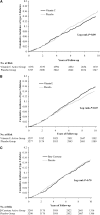Effects of vitamins C and E and beta-carotene on the risk of type 2 diabetes in women at high risk of cardiovascular disease: a randomized controlled trial
- PMID: 19491386
- PMCID: PMC2848361
- DOI: 10.3945/ajcn.2009.27491
Effects of vitamins C and E and beta-carotene on the risk of type 2 diabetes in women at high risk of cardiovascular disease: a randomized controlled trial
Abstract
Background: Vitamin C, vitamin E, and beta-carotene are major antioxidants and as such may protect against the development of type 2 diabetes via reduction of oxidative stress.
Objective: The purpose of this study was to investigate the long-term effects of supplementation with vitamin C, vitamin E, and beta-carotene for primary prevention of type 2 diabetes.
Design: In the Women's Antioxidant Cardiovascular Study, a randomized trial that occurred between 1995 and 2005, 8171 female health professionals aged > or =40 y with either a history of cardiovascular disease (CVD) or > or =3 CVD risk factors were randomly assigned to receive vitamin C (ascorbic acid, 500 mg every day), vitamin E (RRR-alpha-tocopherol acetate, 600 IU every other day), beta-carotene (50 mg every other day), or their respective placebos.
Results: During a median follow-up of 9.2 y, a total of 895 incident cases occurred among 6574 women who were free of diabetes at baseline. There was a trend toward a modest reduction in diabetes risk in women assigned to receive vitamin C compared with those assigned to receive placebo [relative risk (RR): 0.89; 95% CI: 0.78, 1.02; P = 0.09], whereas a trend for a slight elevation in diabetes risk was observed for vitamin E treatment (RR: 1.13; 95% CI: 0.99, 1.29; P = 0.07). However, neither of these effects reached statistical significance. No significant effect was observed for beta-carotene treatment (RR: 0.97; 95% CI: 0.85, 1.11; P = 0.68).
Conclusion: Our randomized trial data showed no significant overall effects of vitamin C, vitamin E, and beta-carotene on risk of developing type 2 diabetes in women at high risk of CVD. This trial was registered at clinicaltrials.gov as NCT00000541.
Figures



Comment in
-
Diabetes risk: antioxidants or lifestyle?Am J Clin Nutr. 2009 Aug;90(2):253-4. doi: 10.3945/ajcn.2009.28177. Epub 2009 Jun 24. Am J Clin Nutr. 2009. PMID: 19553302 No abstract available.
References
-
- Vijayalingam S, Parthiban A, Shanmugasundaram KR, Mohan V. Abnormal antioxidant status in impaired glucose tolerance and non-insulin-dependent diabetes mellitus. Diabet Med 1996;13:715–9 - PubMed
-
- Evans JL, Goldfine ID, Maddux BA, Grodsky GM. Are oxidative stress-activated signaling pathways mediators of insulin resistance and beta-cell dysfunction? Diabetes 2003;52:1–8 - PubMed
-
- Ceriello A, Motz E. Is oxidative stress the pathogenic mechanism underlying insulin resistance, diabetes, and cardiovascular disease? The common soil hypothesis revisited. Arterioscler Thromb Vasc Biol 2004;24:816–23 - PubMed
-
- Gopaul NK, Manraj MD, Hebe A, et al. Oxidative stress could precede endothelial dysfunction and insulin resistance in Indian Mauritians with impaired glucose metabolism. Diabetologia 2001;44:706–12 - PubMed
Publication types
MeSH terms
Substances
Associated data
Grants and funding
LinkOut - more resources
Full Text Sources
Medical

